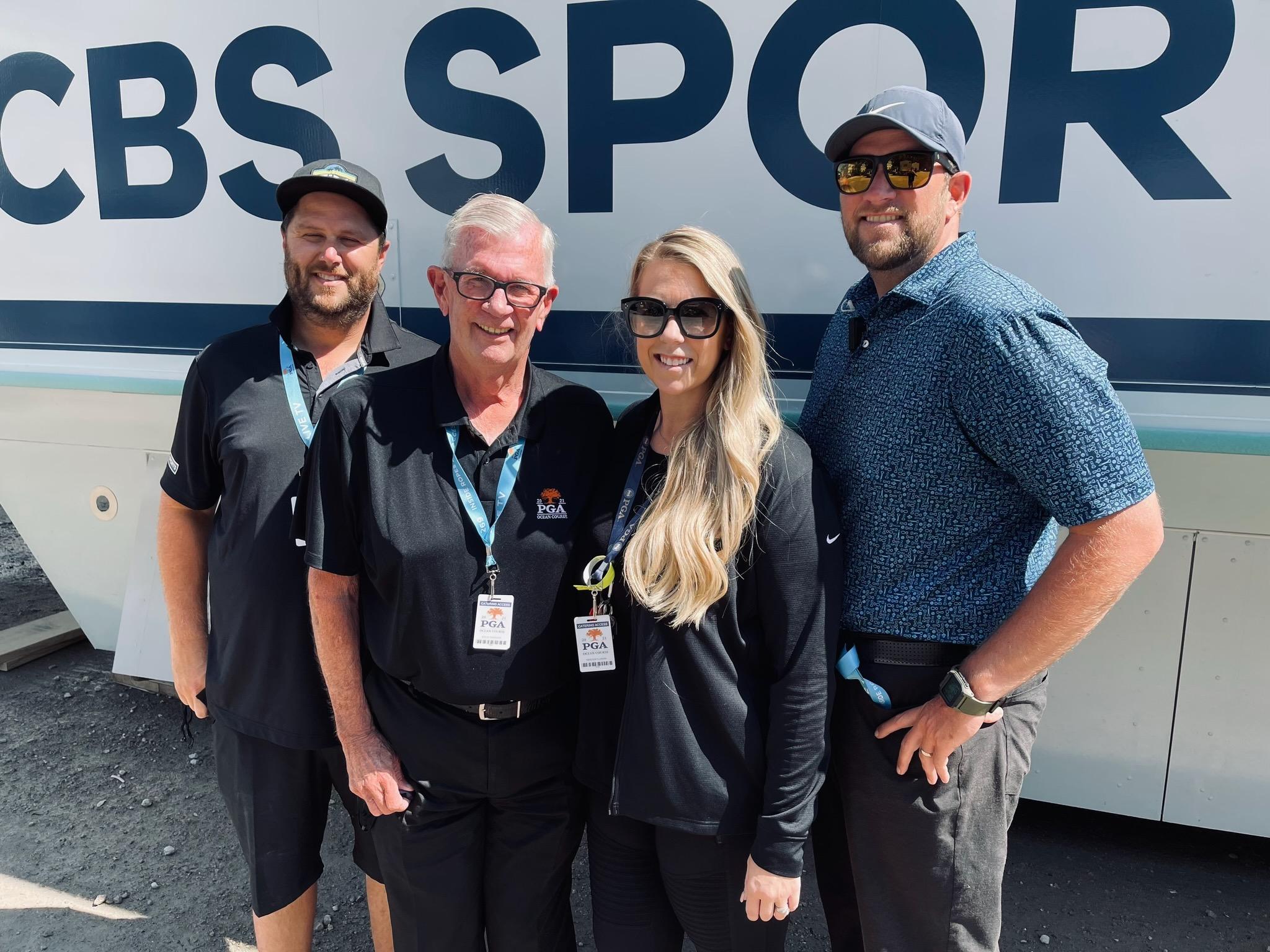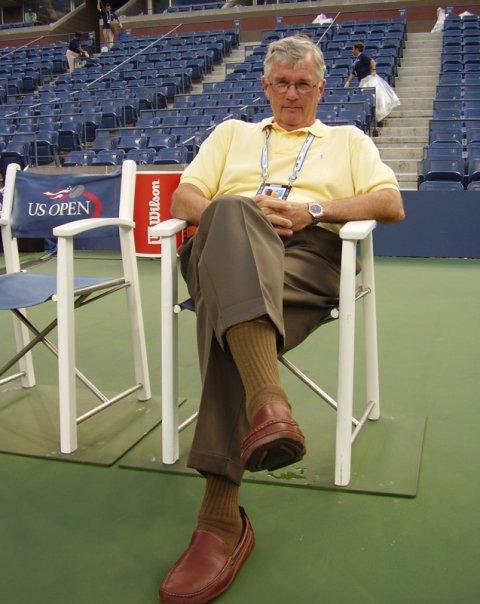Remembering CBS Sports, USTA Production Legend Steve Gorsuch
For more than 40 years, he transformed golf, tennis production
Story Highlights
Steve Gorsuch, who spent decades at CBS Sports in a variety of roles and then spent 15 years as head of broadcasting for the US Open tennis tournament, died this week at the age of 74. In a career spanning more than 40 years, he redefined both tennis and golf operations, oversaw their transition from SD to HD, and was known for having a great understanding not only of how technology works but of people as well.
“Steve was instrumental to our success across a variety of sports and was the cornerstone to our golf operations on CBS Sports,” says Patty Power, EVP, operations and engineering, CBS Sports. “His contributions are immeasurable, and his impact will live on for years to come. Steve was a friend to all and mentor to so many across our industry. He will be greatly missed. My condolences go out to [his wife] Patti and the entire Gorsuch family, including his children, who are carrying on his legacy and standard of excellence at CBS Sports.”

Steve Gorsuch (second from left) with his children (from left) Scott, Krissi, and Ryan, all of whom are in sports-TV production
Gorsuch is survived by Patti Gorsuch; three children, Scott Gorsuch and wife Alysia; Ryan Gorsuch and wife Becca; Krissi Florian and husband Matthew; grandchildren Lucas, Noa, and TJ; and his beloved golden retriever, Hudson.
“No one has affected technical operations and engineering for the two sports of golf and tennis like Steve Gorsuch,” says Ken Aagaard, former chairman, SVG, and chairman, Sports Broadcasting Hall of Fame, who worked closely with Gorsuch at CBS Sports and the US Open. “His legacy within how these sports are covered is everlasting.”
The Monmouth County, NJ, native’s career began at the local Monument Park Racetrack and ranged from working a camera (capturing Secretariat winning the Belmont Stakes by 31 lengths and Dwight Clark’s famous “The Catch,” which propelled the San Francisco 49ers to Super Bowl XVI) for CBS Sports to becoming director of broadcast operations for the USTA Billie Jean King Tennis Center.

Steve Gorsuch was known for being able to make everyone feel equally welcome at the US Open, whether a long-time domestic rightsholder or a brand-new international rightsholder.
USTA CEO Lew Sherr says that, for more than 15 years, Gorsuch was the US Open broadcast team: “He made sure the US Open was on the air all around the world. He knew every inch of the grounds, the angle of every camera. Steve oversaw many of the innovations of the US Open coverage as the event grew beyond all expectations to include new stadiums and a roof over Arthur Ashe Stadium.”
ESPN VP, Production, Jamie Reynolds, who worked closely with Gorsuch on the US Open, says he made an event work seamlessly. “He had a great sense of understanding the scope of a project, the ability to bring the right people together, and could always find a solution to any sort of problem. Steve always came with a smile that matched his dry wit and always had just enough historical perspective to make every recommendation (or directive) take on a little more meaning. His experience and storytelling benefit us all.”
Starting Out
In the summer between his junior and senior years at American University in Washington, DC, Gorsuch was walking down a hallway in Monmouth Park Racetrack and saw a sign that said TV Control Room. At the time, he was studying TV production at school.
“I walked in,” Gorsuch once recalled, “and the head guy in the control room said, ‘What do you do?’ And I said, ‘I’d like to do camera.’ He said, ‘OK, great, you start on Monday.’ That was basically the interview.”
Gorsuch operated camera at Monmouth Park for the rest of that summer. Although his interests tended more toward sports video and photography, he secured an internship with NBC News in Washington, DC, during his senior year. After graduating, he continued to do racetrack camerawork for two more years, adding Aqueduct, Saratoga, Belmont, Yonkers, Roosevelt, Liberty Bell, Atlantic City Racecourse, and Freehold to his résumé.
While working at Belmont and Saratoga, Gorsuch became acquainted with the CBS Sports team covering the races. Two years after graduating from college, he went to work for the company packaging the CBS Sports Spectacular, Marvin Sugarman Productions. In 1975, while covering a race at Yonkers, he heard that CBS Sports was hiring. Once again, Gorsuch decided to walk into the place he wanted to work and see what would happen.
“I heard that the next day was the last day they were hiring,” he said, “so I went down to CBS, walked in the door, went up to be interviewed, and they hired me on the spot. Luckily, a lot of the production people were CBS Sports people I had worked with on CBS Sports Spectacular, so they already knew me [even though] I wasn’t a CBS Sports guy.”
It didn’t take long for Gorsuch to become a “CBS Sports guy.” From 1975 to ’82, he served as a camera operator, covering various events including the U.S. Open and the Super Bowl. Gorsuch’s last year in this capacity coincided with John Madden’s first as a Super Bowl commentator — Super Bowl XVI at the Pontiac Silver Dome — for which Madden stressed the need for camera assignments when televising football.
“[Madden] took the whole camera crew and said, ‘Listen, guys. We’re going to do assignments,’” remembered Gorsuch. Instead of having each camera operator follow a wide receiver in motion, who may do nothing, Madden encouraged the entire crew to recognize the plays and to break away in the middle to focus on the action.
“Somewhere during the first quarter, I think, everybody on the camera crew realized this really works,” said Gorsuch. “We [would get] a million angles without having a million tape machines.”
Former CBS Sports Co-ordinating Producer Lance Barrow says he first worked with Gorsuch while Barrow was a spotter for Pat Summerall. At that time, Gorsuch handled the camera in the booth, but it was on the golf events where their relationship blossomed.
“In golf,” Barrow notes, “you’re dealing every week with different organizations, different groups, and different people running the golf tournament. Steve made everybody feel comfortable and made everybody feel like they were as important as anyone in the room. And he had experience at so many positions and knew what it was like to be in different kinds of positions. I think that’s what made him so good, along with being a great person.”
In 1982, Gorsuch retired his camera in favor of a new career as a technical director. After spending two years with WCBS New York and a year with CBS Evening News, he returned to CBS Sports as a sports technical director. Soon, he was named CBS Sports’ first “hyphenate,” a position created by CBS fusing the technical-director and manager roles. Though citing the role as one of his most challenging, Gorsuch succeeded in juggling management concerns with union opinions by putting fairness above allegiance.
“When first asked how I would side with any one team, I said I’m just going to be fair,” said Gorsuch. “You’re only as good as your word.”
Taking the Reins from a Mentor and Friend
Gorsuch remained at CBS Sports as a “hyphenate” until 2003, when he was offered the position of broadcast consultant for the USTA. To take on the new consulting role, he retired from CBS and formed his own consulting company, through which he managed the US Open on the domestic and international fronts. In 2007, at Aagaard’s request, Gorsuch added golf to the repertoire.
“Steve’s true superpower was his ability to build strong relationships,” says Sherr. “He had the respect of every person he worked with. As much as he loved the US Open, he was loved by everyone around him. The US Open would not be what it is today without Steve Gorsuch. To say he will be greatly missed is an understatement.”
A celebration of life will be held at a later date at Van Emburgh-Sneider-Pernice Funeral Home, Ramsey, NJ. In lieu of flowers, donations may be made in memory of Steve to St. Jude Children’s Research Hospital, stjude.org. Please visit vanemburghsneider.com for service information.
